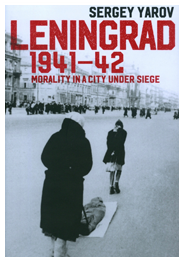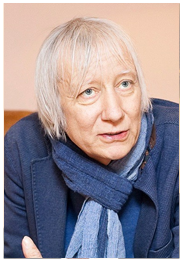SERGEY YAROV | |
| SERGEY YAROV (1959-2015) was Professor of History at the European University, St Petersburg, and Herzen Russian State Pedagogical University, as well as Senior Research Fellow at the St Petersburg Institute of History of the Russian Academy of Sciences. His work focused on twentieth-century Russian history, and the siege of Leningrad in particular. He was awarded the Likhachev Foundation’s Antsiferov Prize in 2012 and the Dynasty Foundation’s Educator (Prosvetitel’) Prize in 2014.
|
| | ||
 | Sergey Yarov Leningrad, 1941-42 Translated by Arch Tait Sergey Yarov/ Leningrad, 1941-42 Morality in a City under Siege With an Introduction by John Barber Polity Press Cambridge, 2017 Hardback, £35.00 ISBN 978-1-5095-0798-6 No eBook available 460 pages Translation kindly supported by the Mikhail Prokhorov Foundation Transcript Programme | |
| St Petersburger Sergey Yarov was, until his cruelly premature death, one of Russia's leading historians, and in this spare, searing analysis of his home city’s greatest disaster, he is at the height of his powers. Unlike conventional eulogies to siege heroism, Yarov’s retrospective anthropology, drawing on hundreds of diaries and documents, shows us what he calls ‘real people, irate, resentful, but still imbued with a sense of compassion’. Amid the horrors of disintegration and degradation, he testifies to how ‘Leningrad saved itself through redeeming actions great and small’. An intensely moving and unforgettable book. Catriona Kelly, University of Oxford When most people in a great city were dying of hunger, some died faster than others. Some lived by privilege, by crime, or by the goodness of others. Some were empowered to decide which others would live or die. What does this tell us about their morality – and about our own rules of ethical behaviour? Sergey Yarov’s study of wartime Leningrad is an unblinking inquiry into the depths of the human spirit. Mark Harrison, Warwick University While in Russia many historians of the siege ignored or minimized negative aspects of people's behaviour during it, Yarov shows both the self-sacrifice and the selfishness, the heroism and the egoism that were displayed at all levels of society. Leningrad 1941-42 is an outstanding book and one which sheds a great deal of new light on how people behave in extreme conditions. It will undoubtedly be of interest to a wide readership. John Barber, University of Cambridge This depiction of humanity in extreme circumstances has significance beyond the fate of a particular city and will make many readers wonder how they would behave in similar conditions. A. W. Purdue, Times Higher Education | ||
